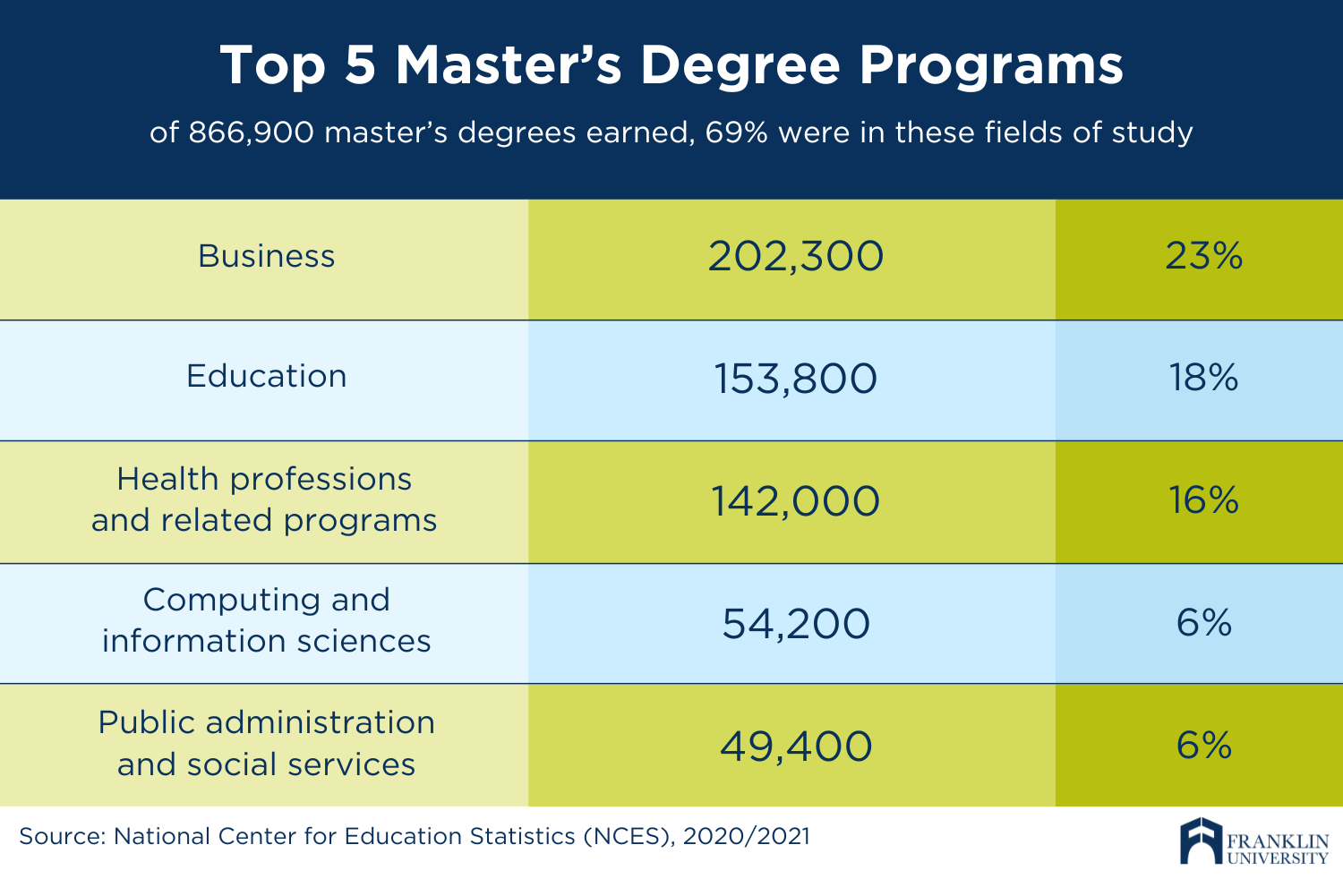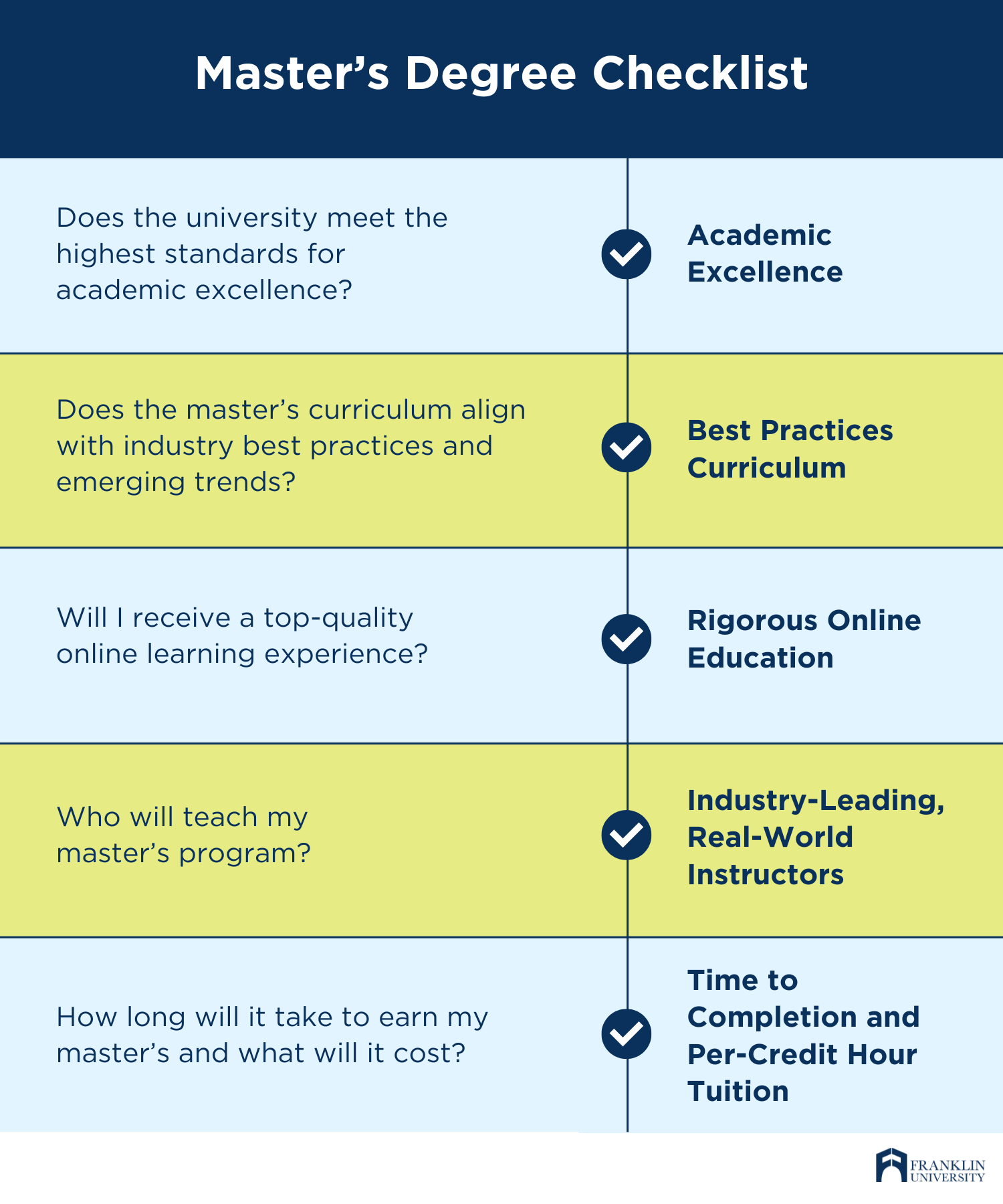Request Information
We're Sorry
There was an unexpected error with the form (your web browser was unable to retrieve some required data from our servers). This kind of error may occur if you have temporarily lost your internet connection. If you're able to verify that your internet connection is stable and the error persists, the Franklin University Help Desk is available to assist you at helpdesk@franklin.edu, 614.947.6682 (local), or 1.866.435.7006 (toll free).
Just a moment while we process your submission.

What Master’s Degree Should I Get? Follow These 4 Steps to Decide
Are you thinking of getting a master's degree but don’t know which master’s program is right for you?
It’s okay, because that means you’re looking at all your options before making one of the most important decisions you’ll ever make. Remember, earning a master’s degree is as much a personal journey as it is a professional undertaking.
“Which Master’s Degree Should I Get?”
That’s the million dollar question. So, here are some facts and figures to help you answer it.
According to the National Center for Education Statistics (NCES), 866,900 people earned their master’s-level degree in the 2020-2021 academic year with 69% of those earning their degrees in these five fields of study:
1. Business | 202,300 | 23%
2. Education | 153,800 | 18%
3. Health professions and related programs | 142,000 | 16%
4. Computing and information sciences | 54,200 | 6%
5. Public administration and social services | 49,400 | 6%

What matters most when choosing a master’s program? Compare features, benefits and cost to find the right school for you.
How to Decide Which Master’s Degree You Should Get
There are a lot of choices when it comes to getting a master’s degree. The key is figuring out which of the many available master’s degree programs aligns best with your profession and your future goals.
Here are four more steps to help figure out the right master’s degree program for you.
Step 1: Find Your “Why.”
Getting clear about your “why” can help you narrow down your master’s degree program choices. So, ask and answer these questions for yourself: “Why do I want to get a master’s degree right now?” and “How can a master’s degree help me and benefit my career?”
Your “why” is personal to you, of course, but here are some of the most popular reasons to earn a master’s degree:
Increase your current salary and future earnings
- Qualify for a different role within your current organization
- Speed up your career advancement opportunities
- Prepare for executive/leadership positions
- Move into a new career and/or transition out of a diminishing profession
- Gain specialized expertise and skills that set you apart from your peers
- Join a new, highly competitive company
- Expand your network and connect with like-minded professionals
- Prepare for a career in academia or a doctorate degree
Which of these reasons resonate most with you? Those are your “why,” so use them as a checklist to compare master’s degrees and create a short list.
Step 2: Pick a Path.
When it comes to master’s degrees, there are two paths: general and specialist. A general path can help broaden your skills and improve your cross-functional knowledge. A specialist path, on the other hand, is designed to deepen your technical skills and expertise in a single functional area.
Popular Master’s Degrees: General Path
A general master’s degree offers long-term career flexibility while preparing you for cross functional leadership opportunities. Some of the most popular general master’s degrees include:
- Master of Business Administration: For the aspiring executive, an MBA degree can put you at the forefront of business and leadership strategies. This program is designed to help you gain critical thinking, strategic decision making and management skills across all major functions of business, including human resources (HR), marketing, finance and operations.
- Master of Healthcare Administration: For the innovative healthcare leader, an MHA can help you lead within a complex and highly regulated healthcare industry. This program can prepare you to balance patient needs with fiscal responsibility and drive operational efficiencies without compromising quality and delivery of care.
Popular Master’s Degrees: Specialist Path
A specialist master’s degree prepares you for discipline-specific leadership opportunities and niche careers. Some of the popular specialist master’s degrees include:
- Master’s in Data Analytics: For the data junkie, an M.S. in Data Analytics can help you harness the power of data to empower top-level business decisions. This program is designed to teach you how to mine, organize, manipulate and manage data in a user-friendly way to create a competitive advantage for your organization.
- Master’s in Business Psychology: For the curious-minded, an M.S. in Business Psychology can equip you to better understand and motivate behavior. This program can help you leverage the latest psychological and neuroscience research to influence employee and consumer behavior and promote on-the-job success.
- Master’s in Cybersecurity: For the tech pro, an M.S. in Cybersecurity can prepare you to keep up with (and get ahead of) the growing and changing risks. This program can equip you to better tackle cybersecurity threats and challenges at the operational, technical and strategic levels and create proactive solutions that maximize resources and minimize risk.
Still not sure which master’s degree path is right for you? Here are some practical tactics that can help you decide:
- Dig into the job descriptions, roles and responsibilities of the career you want, then find a curriculum that aligns with these aspirations.
- Interview professionals who are already in your desired career or field to find out what employers are looking for, then match those skills to your master’s degree program.
- Talk with your employer about what it takes to advance in your current role or move into a new one. Some employers may even help with the cost of tuition because your masters-acquired skills can bring value to the organization.
- Do an online search about the long-term career prospects for the different roles you’re interested in, then see which master’s degree is the best fit.
Step 3: Research Your Options.
With a fairly solid idea of which master’s degree you want to pursue, now it’s time to evaluate your options. Because of its convenient class schedule, most working professionals will want to earn their master’s degree online. That means it’s even more important to look for a high-quality online master’s degree program from an accredited, nonprofit, online college or university.

Here are a few things to look for while researching your options for online master’s degree programs.
- Ask yourself: Does the university meet the highest standards for academic excellence?
- What to look for: An institutionally accredited university with high graduation rates
- Ask yourself: Does the master’s curriculum align with industry best practices and emerging trends?
- What to look for: A master’s program that regularly evaluates and evolves the curriculum with the input of industry experts and employers
- Ask yourself: Will I receive a top-quality online learning experience?
- What to look for: A university with a long history with online education and a rigorous model for developing online curriculum
- Ask yourself: Who will teach my master’s degree courses?
- What to look for: A master’s program that employs instructors with extensive practical experience applying concepts to real-world situations
- Ask yourself: How long will it take to earn my master’s degree and what does a master’s cost?
- What to look for: A master’s program that clearly defines time to completion and how total cost is related to the number of credit hours required for completion
Step 4: Finalize Your Choice.
Before you make your final selection remember that not all master’s degree programs are created equal. It’s important to be thoughtful about your choice of both the university and the master’s degree program because it will impact the skills, knowledge and network you build throughout your master’s program. Remember, too, that your choice also has a direct correlation to how successfully you’ll be able to balance your education, career and other commitments.
The Right Master’s Degree: 4 Simple Steps [Summary]
When it comes to deciding which master’s degree to get, don’t guess, flip a coin, or rely on other people’s opinions. Instead, take the time to think about why a master’s degree is important to you and your career. Also, consider whether the master’s program matches your interests and goals, and how it will fit into your already crazy-busy life.
If you want an experience that’s similar to a traditional program and with all of the advantages of online degrees, find a student-centered institution like Franklin University. Franklin is built for working adults. Through engaging online courses, expert instructors and hands-on applications of the latest industry tools, you’ll gain nimble skills that will help advance your career.
Explore our complete list of master’s programs to choose the right one for your career goals.’





